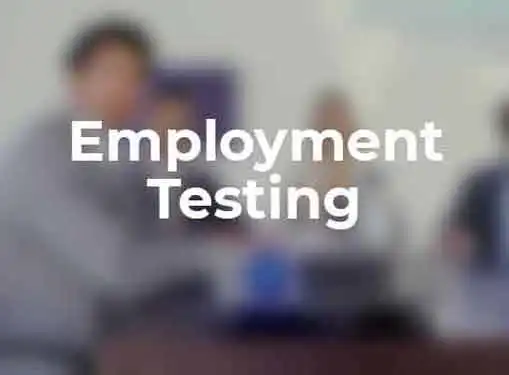Legal Information for Entrepreneurs
Employment Testing Legal Issues
Testing employees before hiring them sounds innocent enough. But in fact there are many legal requirements that you should know about.
Hiring employees can be like rolling the dice.

Resumes and interviews are helpful, but pre-employment testing is the only way to really verify a candidate's qualifications and abilities. The problem is that pre-employment testing is subject to strict legal restrictions and if you don't know what they are, you could find yourself in hot water.
Pre-employment testing is subject to restrictions under both federal and state law. However, since the laws are not necessarily clear cut, business owners often conduct testing that falls outside of the legal parameters. As a result, many small business employers are completely unaware that their company is legally vulnerable. Although it's a good idea to consult an attorney before you conduct any pre-employment tests, here are some of the things you need to consider.
Skill Testing
There are a variety of types of skill tests you may want to conduct with a potential employee. Everything from advanced mechanical ability to basic office skills are fair game - as long as they are limited to testing specific skills the employee needs to perform his job.
Personality and Psychological Testing
Tests designed to assess an employee's personality type or psychological profile can give you insight about an individual's ability to interact with others in the workplace. Unfortunately, they can also open the door for lawsuits because they can potentially reveal information about the individual's religious beliefs, sexual preferences, or mental disabilities.
Medical Exams
Generally speaking, you cannot require job applicants to submit to a physical examination before they have been offered the job. After the applicant has been offered the position, it is possible to require a medical test, but only if you require every new employee to submit to the same exam. If an employee is singled out for medical testing, you could face litigation or penalties for discrimination.
Lie Detector Tests
At some point, nearly every small business employer has thought about submitting a job candidate or hired employee to a lie detector test. But the government is one step ahead of you. The Federal Employee Polygraph Protection Act prohibits employers from requiring applicants to take a lie detector exam unless the business is related to security or pharmaceutical distribution. There are no federal laws stopping you from administering a polygraph to existing employees, although the practice is banned in many state and local jurisdictions.
Drug Tests
Laws governing drug testing vary from state to state. However, certain jobs make drug testing a virtual necessity. To be safe, talk to your attorney before you request an employee to submit to testing.
Other Concerns
Employers need to be especially careful when testing employees or applicants with disabilities. Under some circumstances, testing can be seen as discriminatory. If there is any doubt about whether or not a test violates state, local, or federal law, contact the Department of Labor for more information.
Share this article
Additional Resources for Entrepreneurs



Conversation Board
Are you aware of any other legal issues regarding employee testing and employee screening? If so, let us know by leaving your comments below.